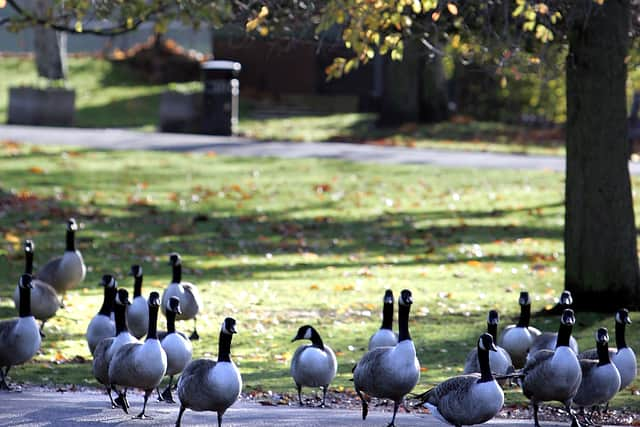Birmingham parks: warning as Avian flu found in Canada geese at city parks
This article contains affiliate links. We may earn a small commission on items purchased through this article, but that does not affect our editorial judgement.
and live on Freeview channel 276
Confirmed cases of Avian flu have been discovered within the wild bird population at parks in Birmingham. The city council has issued a fresh reminder about the issue on Monday (January 31).
The UK Health Security Agency (UKHSA) and Birmingham City Council are now urging people not to touch any sick or dead wild birds in the area – with avian flu confirmed in the Canada goose population in Cannon Hill Park and Witton Lakes.
Advertisement
Hide AdAdvertisement
Hide AdThe council and the UKHSA is working with organisations to manage the situation and protect public health and the risk to other birds, wildlife and pets.
Last month (December), Avian flu was also confirmed in the Canada goose population in Victoria Park, Tipton.
The A(H5N1) strain is highly pathogenic to poultry and other birds, but the risk to human health is considered very low.
However, the city council said it’s vital that people do not touch sick wild birds or wild bird carcasses, and infection control measures may be necessary if they do.


‘It is possible for humans to catch the virus’
Advertisement
Hide AdAdvertisement
Hide AdAngela Cartwright, Consultant in Communicable Disease Control with the UKHSA in the West Midlands, said: “The risk to the public from this strain of avian flu is very low, this is an infectious virus which spreads among birds and it is very unusual for humans to be affected.
“However, it is possible for humans to catch the virus through close contact with an infected bird, dead or alive. Therefore, it is very important that you do not touch any sick or dead wild birds you may find. Equally, you must not touch their droppings, eggs or bedding.
“As a precaution, anyone who has been in contact with the birds or droppings in an area where the infection has been confirmed, may require a course of antiviral medication and close monitoring for 10 days from last contact with infected birds.”
Cllr John O’Shea, Cabinet Member for Street Scene and Parks at Birmingham City Council, added: “This is a very serious situation, so we would urge people to follow the guidance on how to safely use our parks and open spaces.
Advertisement
Hide AdAdvertisement
Hide Ad“This will help reduce risk to both wildlife and people, including our parks staff. The council and partner agencies are working closely on the response to this outbreak, which follows others in various parts of the country – and will continue doing whatever needs to be done to address and control the situation.”
What to do if you have found and touched a sick or dead bird
In areas where the infection has been confirmed or is suspected, anyone who has been in contact with sick or dead birds or their droppings should make sure any footwear is properly cleaned and thoroughly wash their hands in soap and water.
Then contact theUK Health Security Agency’s West Midlands Health Protection Team on 0344 225 3560 so that public health experts can determine if antiviral medication and active surveillance of their condition is necessary.
If you find dead wild waterfowl (swans, geese or ducks) or other dead wild birds, such as gulls or birds of prey, you should report them to the Birmingham City Council team on 0121 454 7810.
Advertisement
Hide AdAdvertisement
Hide AdDo not touch or pick up any dead or visibly sick birds that you find. If you have found a sick or injured bird, contact the RSPCA on 0300 1234 999. Do not touch the bird.
For more information, visit the city council’s website.
A message from the editor:
Thank you for reading. BirminghamWorld is Birmingham’s latest news website, championing everything that is great about our city - reporting on news, lifestyle and sport. We want to start a community among our readers, so please follow us on Facebook,Twitter and Instagram, and keep the conversation going.
Comment Guidelines
National World encourages reader discussion on our stories. User feedback, insights and back-and-forth exchanges add a rich layer of context to reporting. Please review our Community Guidelines before commenting.
